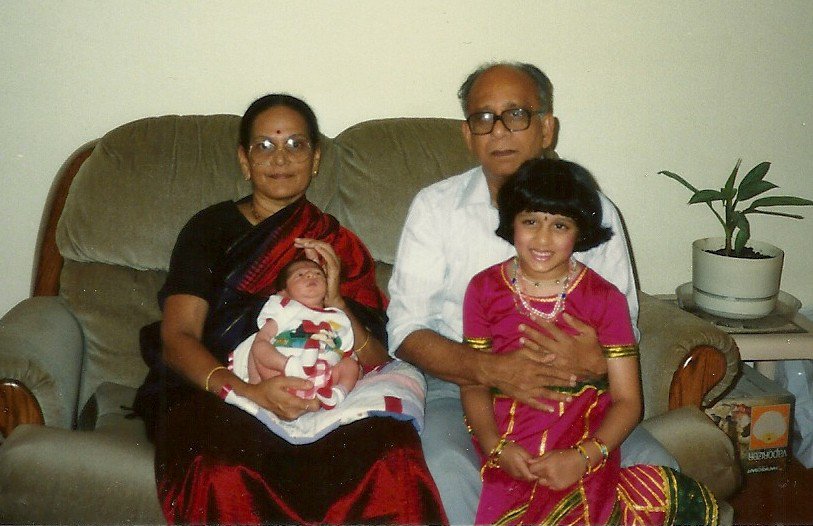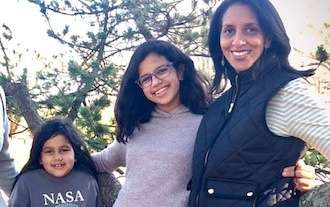Oxfam staff share what Kamala Harris’ appointment as vice president mean to them.
Vice President Kamala Harris is the first in so many ways: our first female vice president; the first Black, Indian, or biracial person to be elected to this office. The daughter of immigrants, her win gives so many marginalized communities the opportunity to see someone like them in a position of power.
In the new vice president, Kamala Devi Harris, I see myself, the daughter of two immigrants. My mother happens to be from Tamil Nadu, the Indian state where many of Harris’ maternal relatives still live. My family thinks of her as one of us—she too has a Sanskrit name that trips up Western tongues (Kamala means lotus; my name, Divya, means divine). She too has had to deal with being the only person like her in many spaces. Her family pictures, featuring grandparents who are solemn-faced and often clothed in wool sweaters and winter caps as they brace themselves against a chill they’ve never experienced in South India, look like mine.

The pride I felt during her acceptance speech is something I’ll never forget. In my lifetime alone, I’ve gone from having no representation in the public sphere—besides Aladdin’s Princess Jasmine—to seeing Kamala Harris in the second-highest political office in this country. Witnessing her shatter so many glass ceilings shows me that I, too, can aim higher than what’s been expected of me. Looking at her beautiful blended family gives me a hope for the future I haven’t had for some time.
What this moment means to me
Ashlee Thomas, Senior Policy Advisor
I am Indo-Caribbean; I have a Jamaican father and Indo-Caribbean mom (of Tamil diaspora), and I got so unexpectedly emotional hearing Kamala Harris mention the impact of her “chitthis” (a term of endearment for your aunties) in her vice presidential acceptance speech. I remember hearing the quote “if she can see it, she can be it.” And for so many magical Black girls, from all walks of life here and abroad, something has shifted.
It was huge to see someone acknowledge the multitudes and intersectionality of Blackness (my Blackness), her roots (our roots), and finally, having these multitudes represented as a living, breathing being—far beyond the trivialization that happens during election years, where people are reductively referred to as “a voting bloc.” As vice president, someone I see so much of myself in, she will contribute to the fabric and story of America in such a huge way.
While we have a long way to go on several fronts (especially when it comes to conversations around identity, intersectionality, intercultural dynamics and diaspora today), Kamala Harris unapologetically embraces her culture (our culture) as a core part of her identity—her glorious, intersectional, full of multitudes and still-worthy-and-enough identity. Whether she knows it or not, she has helped shine light on all of the above. And about time too.
Angie Castera, Vice President of People, Culture, and Global Human Resources

Vice President Kamala Harris often talks about her mother’s influence on her—the values she instilled in her and how those lessons make up who Harris is and impacted what she has accomplished. Hearing that always reminds me of how who I am today is shaped by what I saw and experienced growing up in an immigrant community in Brooklyn, NY.
My values were primarily shaped by the women in my family, particularly my grandmother, who was a staunch feminist. She was a fierce woman who lived by example and had vision for what her children and the future generations could and would become, especially women of color. She taught me to work hard and stand up for what is right; to be who you know you are and not who others say you are; and to take chances and think big because you are capable of doing big things.
As a mom, these values and tenets are what I try to teach my daughter today. Now, thanks to Kamala Harris, there is a difference from my own experience. Her win means my daughter doesn’t have to dream about what’s being told to her like I did. No fantasizing. She can see it. It’s real. When I tell her she can think big, she knows she really can.
Emily Bhatti, Senior Press Officer
A brown girl in the White House? Not possible. That’s what I would have told myself when I was a little girl.
As the daughter of a Pakistani immigrant who embodies the American dream, I was lucky enough to imagine big things for myself as I grew up. But I never, ever would have pictured my brown girl’s face among the white male faces that had filled the roles of president and vice president for generations.
Now I look at Kamala Harris’ face and look into my daughter’s face, and I know that my daughter will forevermore see her rightful place in the most powerful spaces in our country. Kamala Harris is the first, but I know that brown girls everywhere are watching, learning, and embodying everything that her election means for them.
Brown girls everywhere today are looking in the mirror and imagining themselves in that white pantsuit walking on that stage. I can’t go back in time and tell the little girl in the mirror that I belong, but at least I can now confidently tell my daughter that she does indeed belong. And that is the biggest win of all.
Andrea Perera, Vice President of Public Engagement

I’m from California, but I didn’t know much about Kamala Harris when she first decided to run for president. Having lived on the East Coast for almost 20 years, I hadn’t followed her career back home. But during the Democratic nominee debates, I watched her closely and was instantly hooked. Here was this Black and Indian American woman, a prosecutor, who was quick on her feet and completely unphased by attacks or conflict. She felt like family. She looked like family. And the more I learned about her immigrant parents, and her white and Jewish husband and their blended family, I felt like she represented the America I knew. The America I grew up in, not the one I saw on TV.
Then Biden chose her as his running mate, even after she had cut him down decisively in one of those debates, and I was floored. Here was a moderate, older white man with everything on the line willing to pick a woman who had bested him. When does that happen? How confident in himself, in voters, did he have to be to make that choice? Suddenly it felt like she was actually going to get a real shot, not just as the VP, but potentially as president one day.
And I watched her out on the trail, dancing in the rain at campaign rallies, walking out to Mary J Blige, and it all felt … hopeful again. When she introduced Biden as our next president on that stage in Delaware, it was her words I was hanging on: “I may be the first, but I won’t be the last.” My biracial daughters, half white and half Sri Lankan, and my husband, were rapt.
Biden may be our next president. But to me, Kamala is our future.



